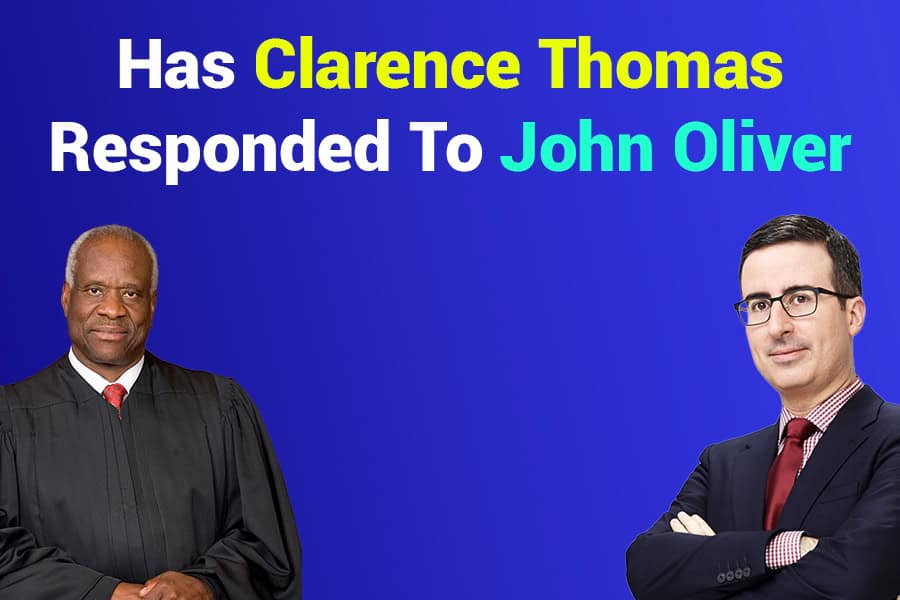The question, “Has Clarence Thomas responded to John Oliver?” has gained attention due to the high-profile critique from the comedian. John Oliver, known for his direct and often biting commentary, recently targeted Supreme Court Justice Clarence Thomas in a segment on Last Week Tonight. This article explores Thomas’s response, the nature of Oliver’s remarks, and the broader implications of this clash between comedy and judicial figures. We’ll provide insights into Thomas’s reaction (or lack thereof), the themes discussed by Oliver, and the media’s take on this public interaction.
Has Clarence Thomas Responded to John Oliver?
While John Oliver criticized Clarence Thomas, the Supreme Court Justice did not respond directly. Oliver’s critique, aired on Last Week Tonight, highlighted various aspects of Thomas’s judicial decisions and personal controversies, but Thomas has traditionally remained silent on public criticism, including this one.
Overview of John Oliver’s Critique of Clarence Thomas
John Oliver dedicated a segment on Last Week Tonight to Clarence Thomas, focusing on his judicial decisions, personal controversies, and perceived conflicts of interest. The episode brought attention to Thomas’s stance on major legal issues, including cases related to voting rights, healthcare, and abortion. Oliver’s sharp commentary highlighted what he believes to be concerning patterns in Thomas’s decisions and personal conduct, particularly regarding gifts and benefits from influential figures. While the content was comedic, it also contained serious accusations about Thomas’s judicial impartiality and ethics. However, Thomas is known for rarely engaging with public criticism, maintaining a dignified silence, even when faced with widespread media coverage.
Clarence Thomas’s Public Response to Criticism
- Thomas’s Silence on Public Criticism
Thomas has consistently avoided responding to public criticism, including that from media personalities like John Oliver. He has often expressed that his focus is solely on judicial duties. - His Focus on Judicial Independence
Thomas’s lack of response aligns with his broader stance on judicial independence. He believes that engaging with media critiques could compromise the Supreme Court’s perceived impartiality. - The Nature of Oliver’s Criticism
John Oliver’s critique was not just limited to Thomas’s judicial rulings but extended to personal controversies. It covered the justice’s alleged connections with wealthy donors and the potential conflicts arising from these relationships. - Why Thomas Chooses Silence
Many legal experts suggest that Thomas’s silence is strategic. Engaging with a comedian could risk undermining the gravitas of his position.
Implications of the Thomas-Oliver Episode
- Impact on Public Perception of the Supreme Court
Oliver’s critique aimed to raise awareness about issues related to the transparency and accountability of the Supreme Court. - Increased Scrutiny on Thomas’s Decisions
The episode likely added to the public’s scrutiny of Thomas’s rulings and decisions, especially in high-profile cases. - Media Reactions
The episode was widely covered by mainstream media, with various outlets discussing the ethical concerns raised by Oliver. - Potential Influence on Legislative Oversight
Oliver’s segment might contribute to calls for greater transparency and ethics reform concerning the Supreme Court.
Historical Context of Clarence Thomas’s Media Interactions
Thomas has been a Supreme Court Justice for over three decades, and throughout his tenure, he has faced significant media scrutiny. His silent approach to critics isn’t new; it was evident during controversies related to his confirmation in 1991 and has continued in response to public criticism regarding landmark decisions. Historically, Thomas has emphasized that the judiciary should be insulated from public opinion to maintain its integrity. His critics argue, however, that remaining silent in the face of serious ethical concerns may damage public trust in the judicial system.
Has Clarence Thomas Responded to John Oliver’s Criticism?
- Direct Response
There has been no official response from Clarence Thomas or his representatives regarding Oliver’s critique. This is consistent with Thomas’s longstanding practice of not engaging with media commentary. - Broader Reactions
- Legal scholars have debated whether Thomas should address public criticism to maintain the Supreme Court’s credibility.
- Some supporters argue that responding to comedic criticism would be beneath the dignity of a Supreme Court Justice.
- Oliver’s critique, while humorous, raised serious ethical questions that Thomas has not publicly addressed.
Warping Up
Thomas’s silence aligns with his historical approach to public criticism. While John Oliver’s commentary has sparked widespread discussion, Thomas’s position as a Supreme Court Justice allows him to maintain a stance of non-engagement. Whether this approach helps or hinders public trust in the judicial system remains debatable. The clash between a comedian and a Supreme Court Justice underscores the complexities of balancing public accountability with judicial impartiality.
FAQ’s
Q. What was John Oliver’s main criticism of Clarence Thomas?
A. Oliver criticized Thomas’s judicial decisions and alleged ethical concerns about personal relationships with wealthy donors.
Q. Has Clarence Thomas ever responded to media criticism?
A. Historically, Thomas has chosen not to engage with media criticism, focusing solely on his judicial duties.
Q. What was the impact of John Oliver’s segment on public perception?
A. Oliver’s segment likely contributed to increased public scrutiny of Thomas’s rulings and ethical concerns surrounding the Supreme Court.

